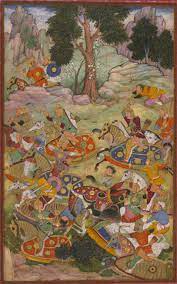The First Battle of Panipat is considered one of the most significant battles in Indian history.

The First Battle of Panipat was fought on April 21, 1526, between the forces of Babur, the founder of the Mughal Empire, and the army of Ibrahim Lodi, the Sultan of Delhi. The battle took place in the town of Panipat, which is located in present-day Haryana, India.
Babur had recently captured the city of Agra and was consolidating his position in northern India when he was confronted by Ibrahim Lodi’s army. Ibrahim Lodi had a much larger army, but his troops were poorly organized and lacked discipline, while Babur’s army was small but highly disciplined and well-trained.
The battle began with an exchange of arrows and cannon fire, followed by a fierce hand-to-hand combat. Despite being outnumbered, Babur’s army was able to hold its ground and slowly gained the upper hand. Ibrahim Lodi was killed during the battle, and his army disintegrated soon after, allowing Babur to capture Delhi and establish the Mughal Empire in India.
The First Battle of Panipat is significant in Indian history because it marked the beginning of Mughal rule in India, which lasted for over three centuries. It also demonstrated the superiority of Mughal military tactics, which relied on highly disciplined troops, the use of firearms, and the effective use of cavalry.
The battle also marked the end of the Delhi Sultanate, which had ruled India for over 300 years. The decline of the Sultanate had been hastened by political instability and weak leadership, and the Mughal Empire emerged as the dominant force in northern India.
Important Links